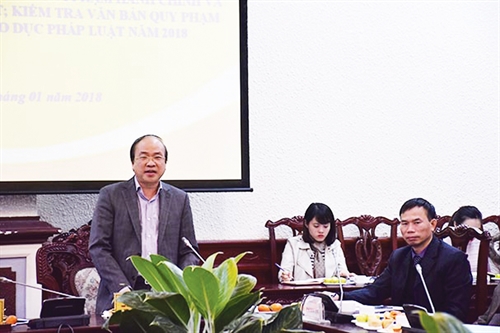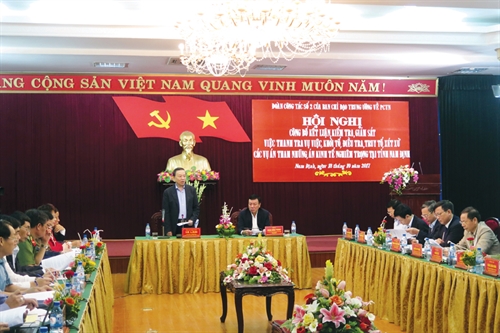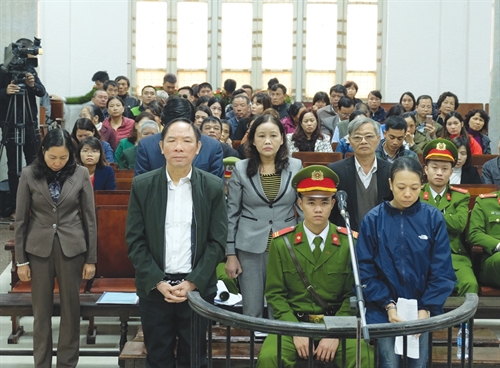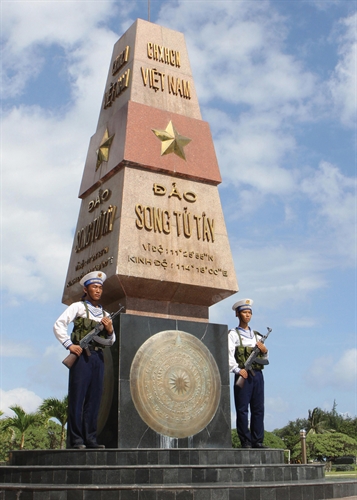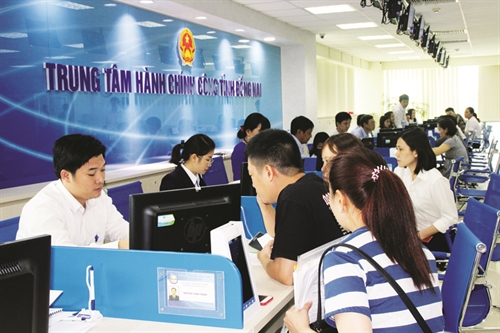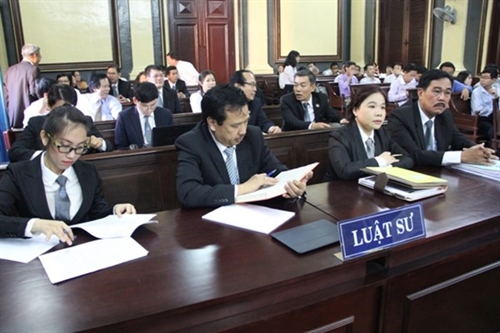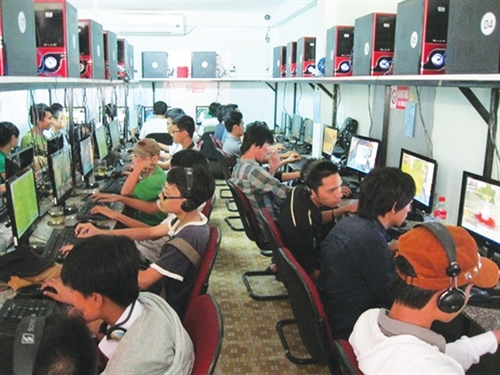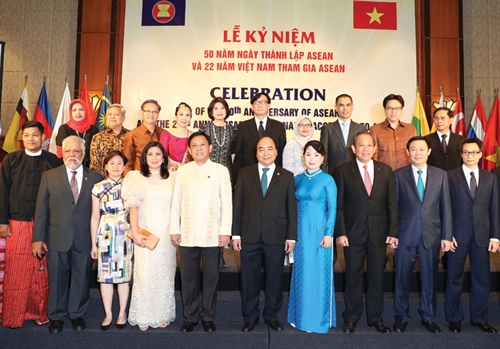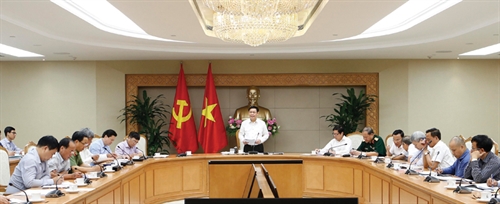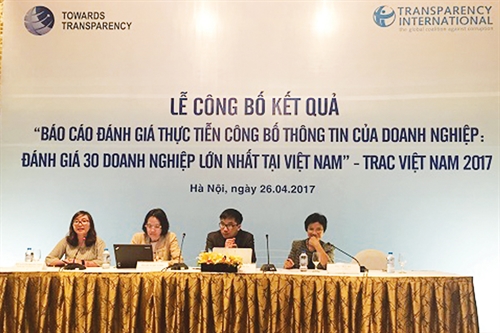Nguyen Phuong Anh and Pham Thanh Trung[1]*
In recent years, the number of environmental violations committed by legal persons has been on the rise in Vietnam including the cases of Vedan, Sonadezi, Nicotex Thanh Thai, Hao Duong Leather Corporation, Tung Kuang Company, and the most recently the case of Formosa Steel Ha Tinh Company in 2016. These violations have not only caused serious effects on the long term health of people but also destroyed the environment and livelihoods. Especially the number of “cancer villages” in Vietnam has risen dramatically. As reported by the Ministry of Natural Resources and Environment (MONRE) in 2015, because of polluted water sources, there were 1,136 deaths from cancer in the 37 cancer villages across Vietnam, but mainly in the northern and central areas, within just few years.[2]
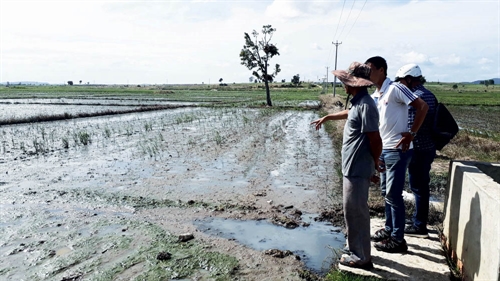 |
| Ia Pa cassava flour plant of the Vietnam Farm Produce and Food JSC in Ia Pa district, Gia Lai province, is reported having discharged untreated wastewater seriously harming local crops __Photo: Du Van Toan/VNA |
Air and water pollution has been a serious issue in the era of booming economic development and the noticeable rise of industrial plants is one of the main sources of the problem. In 2009, Vietnam had around 223 industrial parks nationwide; however, about 70 percent of wastewater of these industrial parks was discharged directly into the environment and polluted the water source.[3] By July 2017, Vietnam had a total of 325 industrial parks across the country.[4] Many rivers almost turn dark, people even can smell odor and water quality is unsafe for drinking, farming or domestic use.
To effectively address environmental violations of enterprises, this article points out some deficiencies of the current handling measures of Vietnam, focusing on administrative law and criminal law. Learning experiences of Japan, the country has successfully overcome the problem of pollution in many serious cases, some suggestions for the government, policymakers, judicial authorities, and relevant environmental management agencies will be proposed to improve the current legal framework and its enforcement.
Lack of mechanism to effectively address enterprises’ environmental violations
Before the promulgation of the 2015 Penal Code (PC), Vietnamese legal framework on handling environmental violations was ineffective with only a few environmental regulations “properly enforced”. From 2006 to 2013, the Environmental Police Department (Ministry of Public Security) detected, investigated and sanctioned 43,300 cases of environmental, hygienic and food safety violations.[5] Approximately 5,000-6,000 cases of environment law violations were discovered per year, but the police could only apply criminal prosecution to 100 cases.[6]
Although the country has established a “jungle of regulations”, but the legal system is still weak on dealing with environmental violations.[7] This is even reflected in the National Strategy for Environment Protection until 2020 with a Vision toward 2030 when it critically stated that “many policies and legal norms have not been implemented”, “many cases have not been handled or have not been handled thoroughly”, and “administrative and criminal sanctions have not been applied properly and strictly”.[8]
Overview of the environmental protection strategies and regulations on handling environmental violations of enterprises
• Policy standard: In 2012, the Prime Minister approved the National Strategy for Environment Protection to 2020, with a Vision toward 2030 in Decision 1216/QĐ-TTg dated September 5, 2012. This document identified six general viewpoints, objectives to 2020, and solutions for environmental protection of Vietnam.[9] Aiming to reform for more effectively achieving the goals of policy making and implementation, Vietnam has developed environmental plans and strategies (Articles 8 to 12 of the 2014 Law on Environmental Protection); however these plans and strategies only generally summarized the assessment of previous successes or failures, and pointed out expected ambitions for the future.
• Technical tools: In 2008, Vietnam introduced the National Technical Regulations on Environment (QCVN) and Environmental Standards (TCVN).[10] The Ministry of Natural Resources and Environment, Ministry of Science and Technology, and Ministry of Health are responsible for drafting these documents. They are national criteria and limits allowed, serving as a basis for environmental management and a technical tool to determine the severity of enterprises’ activities. These technical documents regulate specifically technical parameters to determine the severity of environmental violations and apply suitable mechanisms. In addition, Vietnam also has standards on wastewater, air quality and noise, and pollution in sludge, soil and hazardous waste to control pollution.
• Regulatory framework: Handling environmental violations is mainly regulated in the three laws including: (i) the 2014 Law on Environmental Protection, (ii) the 2012 Law on Handling of Administrative Violations, and (iii) the 2015 Penal Code.
The 2014 Law on Environmental Protection
The 2014 Law on Environmental Protection is the principle law, which contains basic regulations in the environmental field. The Law makes statutory provisions on environmental protection activities, measures and resources used for the purpose of environmental protection; rights, powers, duties and obligations of regulatory bodies, organizations, households and people that are tasked with environmental protection duties. However, the Law does not have a definition of “environmental violations”; it only provides the explanation of business establishments which cause serious environmental pollution. In addition, this Law also stresses that if establishments cause serious pollution, they will be handled by administrative penalties for their violations, and compelled to take measures for pollution removal as well as put on the list of establishments causing serious environmental pollution.
The 2012 Law on Handling Administrative Violations
According to the Law, there are four principal administrative sanctions for violations: (1) warning; (2) fine; (3) deprivation of the right to use permits and professional practice certificates from one month to 24 months; or suspension from operation from one month to 24 months; and (4) confiscating material evidences and means used to commit administrative violations (Article 21.1). The sanctions (3) and (4) can be used as additional sanctions. For instance, if the authorities choose “fine” as the principal sanction, they can use sanction (3) or (4) as an additional penalty. Notably, the additional sanctions must be applied together with the principal ones but for each act of administrative violation, authorities can only apply one principal sanction with one or more additional sanctions for committed administrative violations.
The 2015 Penal Code (revised in 2017)
The latest Penal Code regulates criminal responsibility of commercial legal persons; particularly, environmental violations as criminal offenses of legal persons are stated in 12 articles in Chapter XVIII - Economic Offenses (Articles 227, 232 and 234) and Chapter XIX - Environmental Offenses (Articles 235, 237, 238, 239, 242, 243, 244, 245 and 246). As this is the first time Vietnam applies criminal responsibility for legal persons, the National Assembly decided to go carefully with only a few typical offenses that enterprises normally commit.[11]
The criminal punishment system for enterprises that commit criminal offenses has six types of penalties. There are three principal penalties (Article 33.1) including (1) fine, (2) suspension from operation from six months to three years, and (3) permanent shutdown; and three additional penalties (Article 33.2) which are: (1) ban from operation in certain fields, (2) prohibition from raising capital, and (3) fine (if it is not the principal penalty). The commercial legal persons will have to incur only one principal penalty for a committed criminal offense and possibly one or more than one additional penalty.
Problems of Vietnam’s current regulations on handling environmental violations of enterprises
Regulating corporate criminal responsibility in the new PC is a huge step which reflects the attempt of Vietnam’s authorities to handle environmental violations. However, there are still some limitations in the Vietnamese legal framework.
• Legal gap due to corporate personality of enterprises and the mechanism on dealing with their violations
Environmental damages can be caused by all type of enterprises from a huge company to small household business, from domestic to foreign investments and do not depend on whether they have their corporate personality or not. However, the definition of crime in Article 8 of the 2015 PC only charges criminal responsibility for commercial legal persons. In other words, only a company that has the “legal status” falls into the scope of application of the 2015 PC. The legal status of enterprises is considered an important condition to apply criminal law in handling violations.
For household business and sole proprietorship, property of the business and owner is not separate; so they do not have “legal status” according to Article 74.1.c of the 2015 Civil Code. At the same time, Article 188 of the 2014 Law on Enterprises does not give legal status to economic groups and corporations. Therefore, beside administrative sanctions, Vietnam does not have another mechanism to apply to businesses that do not have the legal status by themselves. As a reason, authorities can only apply criminal penalties to leaders of these enterprises while enterprises can only be handled administratively. They can be considered safe from criminal law just because they do not have legal status as regulated. This is not fair for other types of business that have to face a strict criminal punishment, even permanent shutdown, when they commit violations.
Application of criminal responsibility actually creates the gap in treating enterprises in case they have the same level of violation, one can only get monetary sanctions; while other can receive criminal record. In fact, criminal fine is more severe than the administrative one. The highest criminal fine level is nearly as 7.5 times of the administrative fine level in the environmental field, at VND 15 billion (around USD 750,000) and VND 2 billion (around USD 100,000) respectively. In addition, one remarkable difference between criminal and administrative mechanisms is the “criminal conviction”. This record is one of the six bases to determine recidivism or dangerous recidivism (Article 85.1.c of the 2015 PC) and will become a huge obstacle in the future operation of the offenders.
• An overlap between administrative and criminal regulations
Both administrative sanctions and criminal penalties have two same principal sanctions which are fine and suspension from operation. These two sanctions have different effects and influences on the violators and offenders, which cause confusion to their application. Particularly, if authorities apply an administrative sanction, violators do not have to bear any criminal record, which is very important to determine recidivism. If they have any recidivism and repeat the crime, stricter punishment will be applied and in some cases, it can be considered an aggravating factor as well.
• Closed source of criminal law
In Vietnam, until now, the PC is the only document regulating crime and criminal punishment. Judicial authorities can only apply the criminal mechanism for offenses that are listed in the PC. While amending the 2015 PC, the Standing Committee of the 14th National Assembly identified that extending the source of criminal law means Vietnam criminalizes social/civil relations and this may lead to difficulties in codifying criminal regulations. In practice, to make the law application more convenient, authorities prefer to codifying regulations as many as possible. Therefore, only the PC can define crimes and penalties.[12] However, environmental and economic fields are two typical fluctuated sectors. In recent years, the situation of environmental crimes in Vietnam has witnessed a lot of new types with more and more seriously acts and sophisticated tricks. Therefore, the PC has to be amended timely to handle violations. In contrast, because every single change in criminal law can impact the society, authorities should not amend this code frequently. Furthermore, amending a criminal code requires a lot of time and national budget and human resources.
Japan’s experiences and implications for Vietnam
Japan has had a lot of environmental pollution in the process of restoring the country after World War II; especially Japan could overcome pollution as problems of so many industrial tragedies. Since the mid-1950’s, more than 10 years after World War II, pollution in Japan became a serious social issue. “Japan’s economic miracle” was paid off by the damage to environment and human health; one of the main reasons causing pollution in Japan during this time was that Japanese enterprises only invested 3 percent in their pollution control measures (only 30 billion Japanese yen in 1965).[13] After that, Japan made a lot of efforts to solve environmental issues, including legislative reform, such as the Pollution Diet of 1970. Western countries called this special council as “a blizzard of laws”.[14] At the moment, after many years of efforts, Japan has become an “advanced pollution response nation”.[15] The experiences of Japan could bring some implications for Vietnam to be considered as follows.
For the government and policymakers
• Clearly determine criminal punishment and administrative measure
Japan has also addressed violations of enterprises by administrative and criminal measures. It has numerous administrative sanctions to apply when a violation occurred, namely: deprivation of license to do business, prohibition to do business, fine or pecuniary sanction.[16] At the same time, there are six criminal punishments including: death penalty, imprisonment with work, imprisonment without work, fine, misdemeanor imprisonment without work and petty fine (Article 9 of the 1907 PC). Although two administrative sanctions, which are deprivation of license to do business and prohibition to do business, are very severe against entities, Japan did not use these sanctions as criminal penalties. Only fine, another administrative sanction, is regulated as criminal punishment for corporations that commit environmental violations. Such clearly determined regulations help Japan avoid conflicts while implementing the laws. Thus, Vietnam can consider this experience to minimize the conflicts between administrative sanctions and criminal penalties in application.
• Consider the trend of opening source of criminal law
Criminal law is an important part of the legal framework of Japan. However, this law stresses that “The general provisions of this part shall also apply to crimes for which punishments are provided by other laws and regulations, unless otherwise provided in such laws and regulations” (Article 8 of the 1907 PC). This illustrates that specific laws’ regulations are also applied in conjunction with the PC; even if special provisions of the other laws are different from the general provisions of the PC, they are still valid. By extending the source of criminal law in specialized regulations, this code can remain unchanged since 1907; and when a new crime appears, Japan only needs to update the specialized law rather than the PC. Up to now, there are many specific laws regulating crimes and criminal punishment, such as Tax Law, Environmental Law, and Stock Law. By extending the source of criminal law, Japan’s application of rules of crime and punishment is more practical and adaptable to the changes of daily social life. Not only Japan, but also many other countries, such as China, Germany and France, also use criminal regulations in their secondary criminal code to timely handle new offenses without amending the main penal code.[17]
Based on the experience of Japan, it is suggested that the Vietnamese government consider opening the source of criminal law. Particularly, in the environmental field, the PC of Vietnam can retain some general regulations on crime and punishments; but special laws will determine specific criminal offenses. For instance, the Law on Environmental Protection can regulate environmental crimes, such as causing air pollution, water pollution, hazardous waste; the Law on Forestry can determine specific offenses on forest destruction. In case a new violation occurs, Vietnam will only update each specific law instead of revising the whole PC.
For proceeding-conducting agencies: consider to apply permanent shutdown as criminal penalty
Permanent shutdown is an administrative sanction in Japan; however, courts rarely apply this punishment because it may lead to a lot of social effects, such as bankruptcy or unemployment. For example, if the judges use this strict punishment, the verdict will disturb directly occupations of workers although they may not be involved in the violation of their company. Another point of shutdown is, if a company is to be closed because of its violation, who will be the person to take responsibility to pay for the victims and restore the environment that was destroyed. That is the reason why even causing one of the biggest pollution scandals - Minamata disease in Kumamoto Prefecture, located in the center of Kyushu Island, South of Japan, the court did not apply such severe punishment as shutdown to Chisso Company. Judges believed that it is more necessary to recover the environment that was destroyed by this company and pay compensation to the victims of this tragedy than making this company insolvent.
Vietnam’s 2015 PC has permanent shutdown as the hardest punishment for commercial legal persons that commit crime. This punishment is necessary to handle enterprises which operate for the purpose of committing crimes under Article 79.2 of the 2015 PC and it is a solid affirmation of the government to punish offenders. However, it is suggested that when applying this punishment, the court consider it very carefully or minimize the occasion applying this punishment except the case regulated in Article 79.2 of the 2015 PC.
For environmental management authorities: provide specific guidance (case by case) for enterprises instead of promulgating general normative documents
In Japan, before handling violations by administrative sanctions or criminal punishment, environmental management authorities, such as the Ministry of Environment, will use administrative guidance. Administrative guidance is not a kind of legal normative document; it is a combination of suggestion, recommendation, advice, or other acts that were enacted by an Administrative Organ (Article 2.6 of the 1993 Law on Administrative Procedures). Authorities will make this guidance case by case because it is a “voluntary” or “non-compulsory” document; the Administrative Procedure Law did not punish if one party refuses to follow this guidance.[18] In the post-war period, the Ministry of International Trade and Industry always used this soft instrument as a tool to support infant industries, protect declining industries, restructure the national industrial system, and control public enterprises.[19]
Beside promulgating legal normative documents that are sometimes too general, Vietnam’s relevant state agencies can consider the experiences of Japan to guide companies, industries or individuals to accomplish their duties by a specific guideline, such as improving the wastewater treatment. Before making any decision on sanctions, if the violation is the first time or not so serious, beside warning, the environmental management agencies can help businesses with an administrative guidance or recommendations. Administrative sanctions or even criminal punishment should only be applied if the enterprises or their leaders still continue to pollute the environment.-
https://english.vietnamnet.vn/fms/environment/93863/criminal-law-helpless-in-treating-environment-crimes.html (accessed on October 30, 2017).
content/tintuc/Lists/News&ItemID=437 (accessed on June 10, 2017).
https://doi.org/10.1057/9780230624931_5 (accessed on November 12, 2017).
